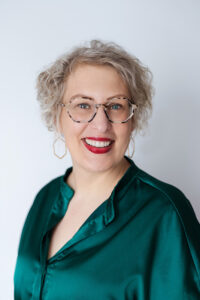Head of Breast Cancer Coalition of Rochester, a cancer survivor herself, explains what the nonprofit does for those diagnosed with cancer
By Mike Costanza
 The Breast Cancer Coalition of Rochester offers support groups, educational classes and other assistance to those who have been diagnosed with breast or gynecologic cancer. It also advocates for more research into the treatment of those dread diseases.
The Breast Cancer Coalition of Rochester offers support groups, educational classes and other assistance to those who have been diagnosed with breast or gynecologic cancer. It also advocates for more research into the treatment of those dread diseases.
With just 12 employees, about 500 volunteers and a current budget of about $1.4 million, the nonprofit assists about 1,500 people a year, whom it refers to as “program participants.”
In Good Health spoke to Christina Thompson, The coalition’s executive director, about her nonprofit. Thompson is a survivor of stage 3 breast cancer.
Q. In a few words, what is the coalition’s mission?
A. Our mission is to cultivate community among those affected by breast or gynecologic cancers, to empower informed decision-making through education, compassionate support and advocacy and to advance regional research with the ultimate goal to eradicate breast and gynecologic cancers.
Q. What are some of the services the coalition offers directly to its program participants?
A. If someone is new with a diagnosis or new to the coalition, they can take what’s called “Breast or Gynecologic Cancer 101.” BC 101 or GYN 101 are one-to-one sessions with me that assist newly diagnosed individuals to manage the complex tasks and emotions of a breast or gynecologic cancer diagnosis. These meetings empower you to be a self-advocate as you proceed through treatment, recovery and survivorship. Two other courses, BC 201 or GYN 201 offer the same approach to those facing a recurrence of their original disease or a new diagnosis of advanced or chronic breast or gynecologic cancer.
Q. What happens next for the program participant?
A. Following their meeting with us, our program staff will kind of debrief the person and we will match them up with a trained peer advocate lending support (PALS) mentor, a volunteer who had a similar situation. Everybody new to the coalition is also given what we call a “PALS” bag. It’s got a lot of great items for people going through treatment. Hand-made quilts, books and reference materials specifically about their diagnosis.
Q. How might a mentor help a program participant?
A. Usually, it’s a reach-out, just to say “Hey, I’ve been through a similar situation. I’d love to get together and chat.” Some people will do a zoom meeting or a phone call. We’ve also had people develop quite a strong friendship.
Q. Could you tell the readers of some of the support groups the coalition offers?
A. We have some that are more general — breast and gynecologic cancer discussion groups. Then we have more specific groups. One is for folks who are newly diagnosed and in active treatment, one that’s just for folks with GYN cancers, one is a really thriving group of young survivors. We also have a group for people living with metastatic breast or gynecologic cancer. These are people who are going to be in treatment for life, so their needs and their supports look different. Some groups are purely virtual, some are in person. Some are a hybrid mix.
Q. What kinds of educational programs does the coalition have?
A. Each month, we offer an evening educational webinar series. The topics vary each month. At the end of this month, (June) it will be on updates in radiation treatment and its effects. Those are always offered by providers in our area and are recorded and listed on our website and library. We also do a healing arts program incorporating movement, gentle yoga, tai chi, qigong, mindfulness meditation, movement in motion. Gentle exercise during treatment and after is evidence-based to really help the outcome.
Q. What challenges does the coalition face today?
A. We’re really taking a look at the current administration that seems to be cutting funding for very important research, and also for nonprofit organizations in general. If funding for research is slashed, then that’s clinical trials. Clinical trials provide the treatments that those with metastatic cancer need. They try clinical trials on the people who need them the most desperately, so it puts all that in jeopardy. That’s pretty devastating.
To obtain more information on the Breast Cancer Coalition of Rochester or support the nonprofit, go to: https://bccr.org.

